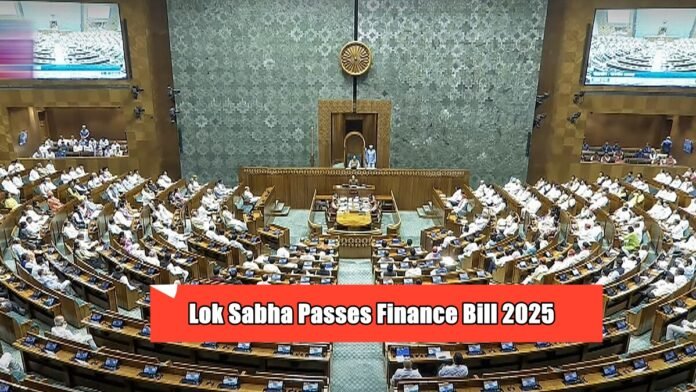
Key Points:
- The Lok Sabha passed the Finance Bill 2025 with 35 amendments, including the abolition of the 6% Equalisation Levy on online ads.
- Finance Minister Nirmala Sitharaman highlighted unprecedented tax relief for taxpayers and realistic income tax growth projections.
- The new Income Tax Bill, simplifying tax laws and reducing litigation, will be discussed in the monsoon session of Parliament.
- Customs duty rationalization aims to boost manufacturing, exports, and reduce inflationary pressures.
New Delhi: The Lok Sabha on Tuesday approved the Finance Bill 2025, incorporating 35 government amendments, marking a critical step in implementing the Union Budget 2025-26. Finance Minister Nirmala Sitharaman described the bill as a landmark initiative designed to provide significant tax relief to middle-class taxpayers and businesses while addressing global economic uncertainties.
Unprecedented Tax Relief
Sitharaman announced that the income tax rebate limit has been increased from ₹7 lakh to ₹12 lakh per annum, offering substantial relief to salaried individuals. With the inclusion of standard deductions, this threshold rises further to ₹12.75 lakh. The move is expected to benefit millions of taxpayers while resulting in a revenue loss of ₹1 lakh crore for FY26. Despite this, personal income tax collections are projected to grow by 13.14% in FY26, reaching ₹13.6 lakh crore.
The Finance Minister also emphasized “marginal relief” for taxpayers with incomes slightly exceeding ₹12 lakh. She reiterated the government’s commitment to honoring taxpayers’ contributions while fostering economic growth.
Abolition of Digital Tax
One of the most notable amendments in the bill is the removal of the 6% Equalisation Levy on online advertisements, effective April 1, 2025. This decision aligns with efforts to address international trade concerns and simplify tax compliance for global digital platforms like Google and Meta. Sitharaman noted that this reform was necessary to adapt to evolving global economic conditions.
Customs Duty Rationalization
The Finance Bill also includes rationalized customs duties aimed at boosting domestic manufacturing and enhancing export competitiveness. By reducing duties on raw materials and inputs, the government seeks to make Indian products more cost-effective in global markets. Sitharaman highlighted that these measures would help mitigate inflationary pressures while supporting local industries.
New Income Tax Bill in Monsoon Session
In addition to passing the Finance Bill, Sitharaman announced that the new Income Tax Bill will be taken up for discussion during Parliament’s monsoon session in July-August. The proposed bill aims to replace the Income Tax Act of 1961 with a simplified framework that reduces litigation and enhances clarity.
Key features of the new bill include:
- A reduction in word count from 5.12 lakh words to 2.6 lakh.
- A streamlined structure with fewer chapters (23 compared to 47) and sections (536 compared to 819).
- Elimination of outdated provisions and introduction of modern compliance measures.
- Enhanced focus on transparency and taxpayer trust through a “Trust First, Scrutinize Later” approach.
The bill also introduces provisions for taxing virtual digital assets and expanding search-and-seizure powers under tax investigations.
Opposition Criticism
While the Finance Bill has been lauded for its taxpayer-friendly measures, opposition leaders criticized it as a “patchwork solution.” Congress MP Shashi Tharoor argued that it lacked structural reforms necessary for addressing deeper economic challenges. Other opposition members raised concerns about indirect taxes disproportionately affecting lower-income groups.
What’s Next?
With its passage in Lok Sabha, the Finance Bill now moves to Rajya Sabha for further deliberation. Meanwhile, all eyes will be on the monsoon session for discussions on the new Income Tax Bill, which promises to revolutionize India’s tax system by simplifying compliance and fostering transparency.
The Finance Bill 2025 underscores India’s commitment to balancing economic growth with taxpayer welfare while adapting to global economic realities.




















































